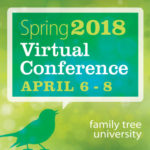 Three (3) days from now is Valentines’s Day. MORE IMPORTANTLY, it’s the opening day of registration for this summer’s three (3 ) weeks of genealogical educations. This summer, the Genealogical Research Institute of Genealogy is offering an extra week and an extra location.
Three (3) days from now is Valentines’s Day. MORE IMPORTANTLY, it’s the opening day of registration for this summer’s three (3 ) weeks of genealogical educations. This summer, the Genealogical Research Institute of Genealogy is offering an extra week and an extra location.
June 24-29, 2018: 8 courses at LaRoche College in Pittsburgh
July 22-27, 2018: 8 courses at LaRoche College in Pittsburgh
July 29-August 3, 2018: 7 courses at Daemen College, Amherst, New York (Buffalo)
During the second week in July and the week in Amherst, I will be joined by other instructors as we present Intermediate Genealogy: Tools for Digging Deeper. Not quite at the intermediate level yet? We will guide you along in between classes. Beyond the intermediate level but need a refresher? We will reopen your eyes and mind during the week and get you back on track in today’s world of genealogy.
Exhausted online resources? You may learn about many more. We all reach the point where we need to learn about other resources and delve more deeply into those we already know. This is the way we take our research to a higher level, solve problems, and advance our family history. This course provides in-depth learning on 19th-21st century U.S. resources and the methodology for using them. We probe deeper into the content, origin, location, and interpretation of records. It’s not just listening to lectures, but interactive classroom time that takes you beyond basic research tools.
Your presence will add to a great week of learning, sharing, and fun. Yes, we have fun, too. A great camaraderie develops in our classroom and with other GRIP Students. The intermediate course students get to do some out-loud thinking and planning, have the chance to have their own research challenge worked on as a group, and some other surprises.
If you register for the intermediate course, watch your email late this spring for a special way to participate and the chance to have one of your genealogical conundrums evaluated, research paths given, and perhaps solved! I will even share some packing tips for those coming from out of town.
For full details on courses and registration, visit the GRIP website and get that computer ready for February 14th. Each week has a special registration start time for this Wednesday.
 2018 Spring Virtual Conference from Family Tree University: Get the Skills to Break Down Your Brick Walls
2018 Spring Virtual Conference from Family Tree University: Get the Skills to Break Down Your Brick Walls


